2805NRS Case Study: Legal and Ethical Principles in Healthcare
VerifiedAdded on 2023/06/15
|12
|3298
|418
Case Study
AI Summary
This case study delves into the legal and ethical challenges faced by healthcare professionals, using a real-world scenario to illustrate complex issues. It begins by examining the importance of patient consent, including scenarios where consent may be modified or overridden in emergency situations. The analysis covers the ethical considerations of providing treatment without explicit consent, particularly when a patient lacks decision-making capacity. The IRAC framework is introduced as a method for resolving disputes, such as disagreements between family members regarding a patient's care. The study also addresses the ethical dilemmas surrounding end-of-life decisions, balancing patient autonomy with medical realities and stakeholder values. Furthermore, it references the Universal Declaration on Bioethics and Human Rights to highlight principles relevant to the case, emphasizing the importance of professional decision-making and individual autonomy. The case study concludes by underscoring the need for healthcare professionals to navigate these complex situations with a strong understanding of both legal requirements and ethical principles. Desklib provides access to similar solved assignments and past papers for students.
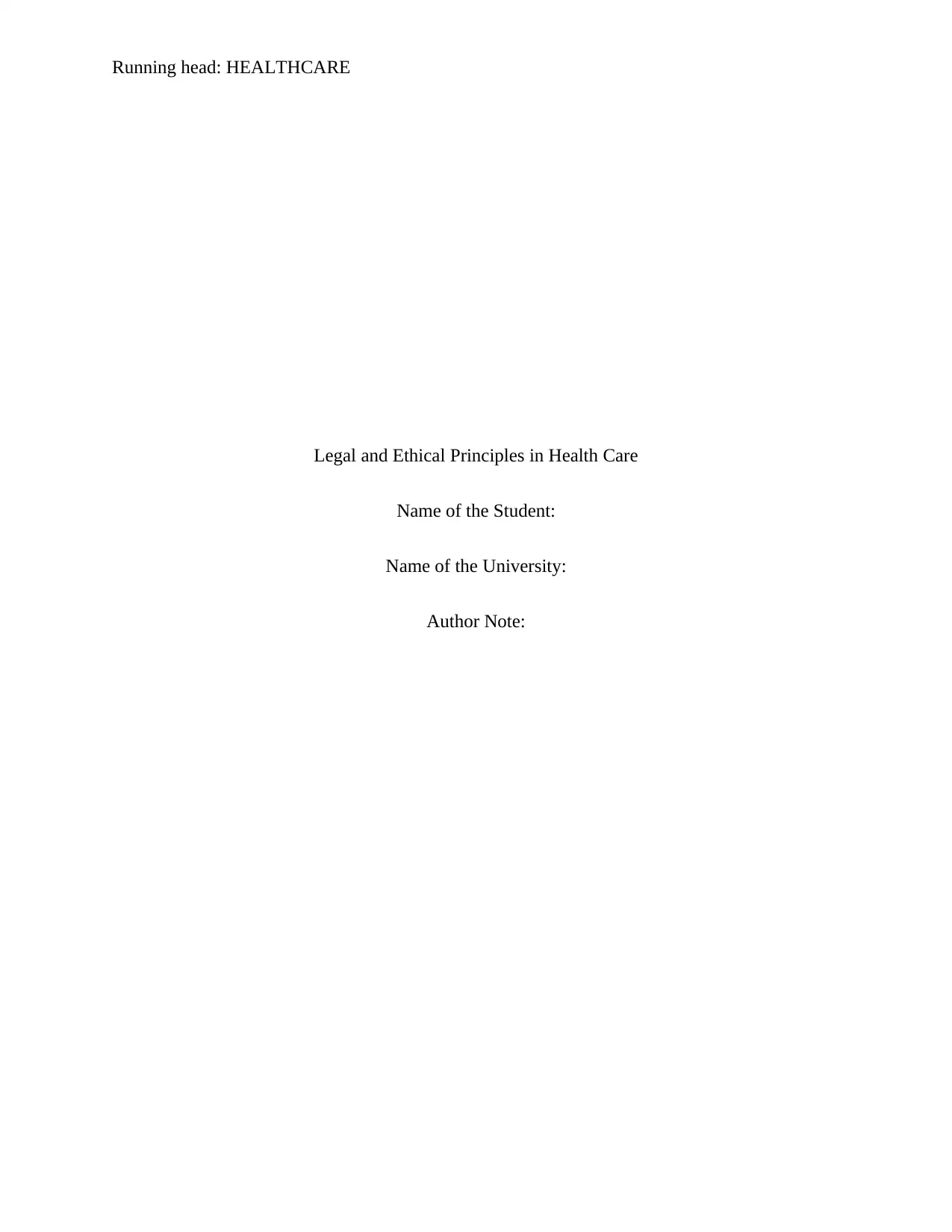
Running head: HEALTHCARE
Legal and Ethical Principles in Health Care
Name of the Student:
Name of the University:
Author Note:
Legal and Ethical Principles in Health Care
Name of the Student:
Name of the University:
Author Note:
Paraphrase This Document
Need a fresh take? Get an instant paraphrase of this document with our AI Paraphraser
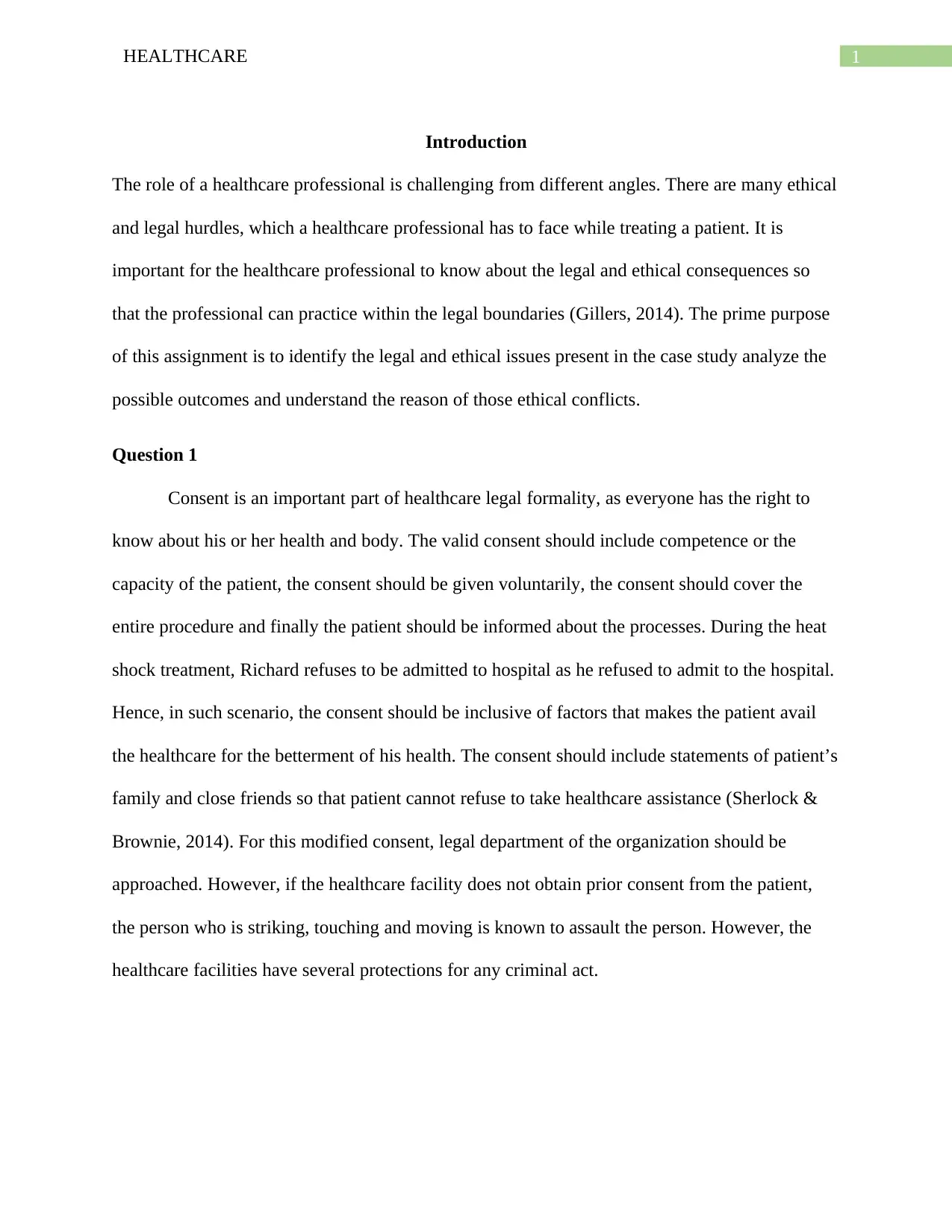
1HEALTHCARE
Introduction
The role of a healthcare professional is challenging from different angles. There are many ethical
and legal hurdles, which a healthcare professional has to face while treating a patient. It is
important for the healthcare professional to know about the legal and ethical consequences so
that the professional can practice within the legal boundaries (Gillers, 2014). The prime purpose
of this assignment is to identify the legal and ethical issues present in the case study analyze the
possible outcomes and understand the reason of those ethical conflicts.
Question 1
Consent is an important part of healthcare legal formality, as everyone has the right to
know about his or her health and body. The valid consent should include competence or the
capacity of the patient, the consent should be given voluntarily, the consent should cover the
entire procedure and finally the patient should be informed about the processes. During the heat
shock treatment, Richard refuses to be admitted to hospital as he refused to admit to the hospital.
Hence, in such scenario, the consent should be inclusive of factors that makes the patient avail
the healthcare for the betterment of his health. The consent should include statements of patient’s
family and close friends so that patient cannot refuse to take healthcare assistance (Sherlock &
Brownie, 2014). For this modified consent, legal department of the organization should be
approached. However, if the healthcare facility does not obtain prior consent from the patient,
the person who is striking, touching and moving is known to assault the person. However, the
healthcare facilities have several protections for any criminal act.
Introduction
The role of a healthcare professional is challenging from different angles. There are many ethical
and legal hurdles, which a healthcare professional has to face while treating a patient. It is
important for the healthcare professional to know about the legal and ethical consequences so
that the professional can practice within the legal boundaries (Gillers, 2014). The prime purpose
of this assignment is to identify the legal and ethical issues present in the case study analyze the
possible outcomes and understand the reason of those ethical conflicts.
Question 1
Consent is an important part of healthcare legal formality, as everyone has the right to
know about his or her health and body. The valid consent should include competence or the
capacity of the patient, the consent should be given voluntarily, the consent should cover the
entire procedure and finally the patient should be informed about the processes. During the heat
shock treatment, Richard refuses to be admitted to hospital as he refused to admit to the hospital.
Hence, in such scenario, the consent should be inclusive of factors that makes the patient avail
the healthcare for the betterment of his health. The consent should include statements of patient’s
family and close friends so that patient cannot refuse to take healthcare assistance (Sherlock &
Brownie, 2014). For this modified consent, legal department of the organization should be
approached. However, if the healthcare facility does not obtain prior consent from the patient,
the person who is striking, touching and moving is known to assault the person. However, the
healthcare facilities have several protections for any criminal act.
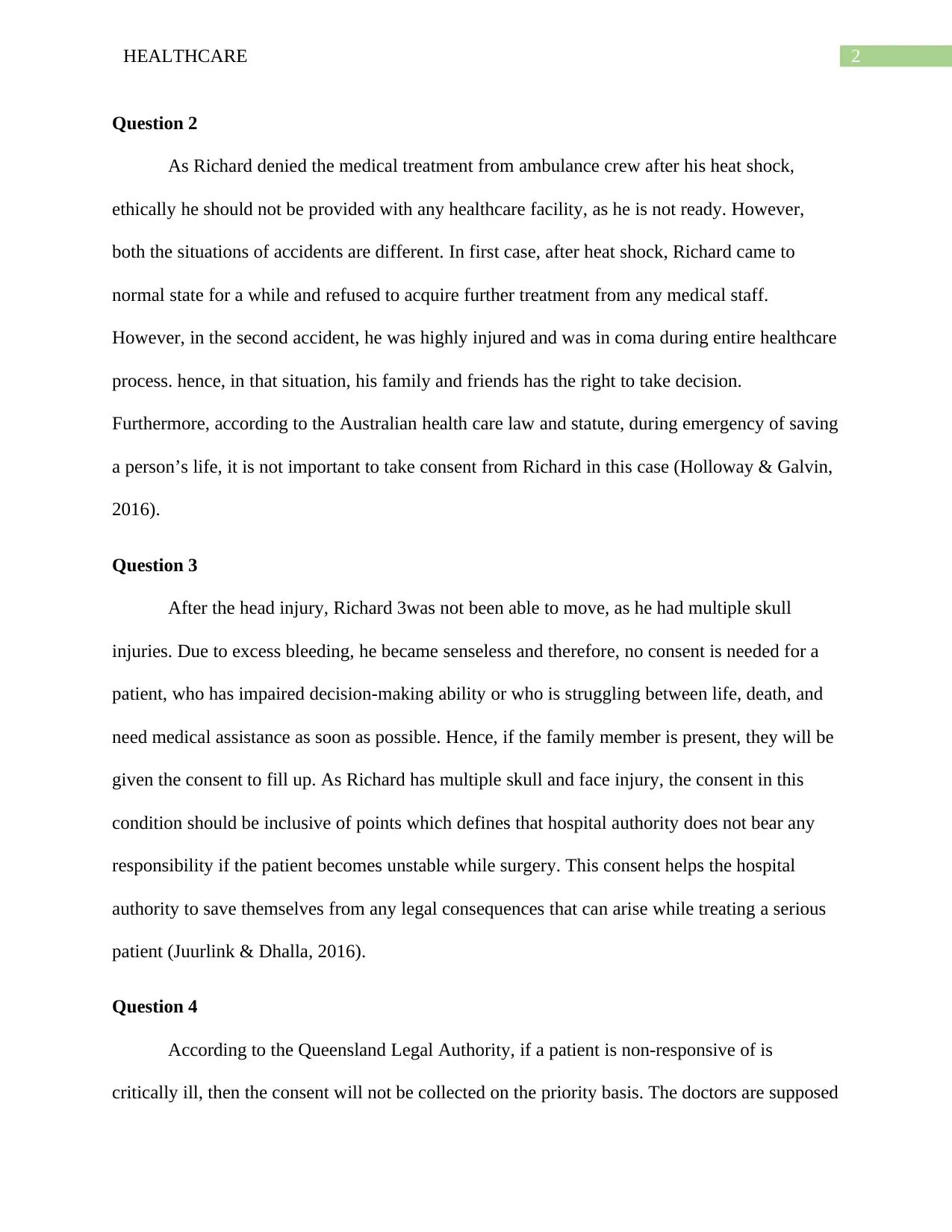
2HEALTHCARE
Question 2
As Richard denied the medical treatment from ambulance crew after his heat shock,
ethically he should not be provided with any healthcare facility, as he is not ready. However,
both the situations of accidents are different. In first case, after heat shock, Richard came to
normal state for a while and refused to acquire further treatment from any medical staff.
However, in the second accident, he was highly injured and was in coma during entire healthcare
process. hence, in that situation, his family and friends has the right to take decision.
Furthermore, according to the Australian health care law and statute, during emergency of saving
a person’s life, it is not important to take consent from Richard in this case (Holloway & Galvin,
2016).
Question 3
After the head injury, Richard 3was not been able to move, as he had multiple skull
injuries. Due to excess bleeding, he became senseless and therefore, no consent is needed for a
patient, who has impaired decision-making ability or who is struggling between life, death, and
need medical assistance as soon as possible. Hence, if the family member is present, they will be
given the consent to fill up. As Richard has multiple skull and face injury, the consent in this
condition should be inclusive of points which defines that hospital authority does not bear any
responsibility if the patient becomes unstable while surgery. This consent helps the hospital
authority to save themselves from any legal consequences that can arise while treating a serious
patient (Juurlink & Dhalla, 2016).
Question 4
According to the Queensland Legal Authority, if a patient is non-responsive of is
critically ill, then the consent will not be collected on the priority basis. The doctors are supposed
Question 2
As Richard denied the medical treatment from ambulance crew after his heat shock,
ethically he should not be provided with any healthcare facility, as he is not ready. However,
both the situations of accidents are different. In first case, after heat shock, Richard came to
normal state for a while and refused to acquire further treatment from any medical staff.
However, in the second accident, he was highly injured and was in coma during entire healthcare
process. hence, in that situation, his family and friends has the right to take decision.
Furthermore, according to the Australian health care law and statute, during emergency of saving
a person’s life, it is not important to take consent from Richard in this case (Holloway & Galvin,
2016).
Question 3
After the head injury, Richard 3was not been able to move, as he had multiple skull
injuries. Due to excess bleeding, he became senseless and therefore, no consent is needed for a
patient, who has impaired decision-making ability or who is struggling between life, death, and
need medical assistance as soon as possible. Hence, if the family member is present, they will be
given the consent to fill up. As Richard has multiple skull and face injury, the consent in this
condition should be inclusive of points which defines that hospital authority does not bear any
responsibility if the patient becomes unstable while surgery. This consent helps the hospital
authority to save themselves from any legal consequences that can arise while treating a serious
patient (Juurlink & Dhalla, 2016).
Question 4
According to the Queensland Legal Authority, if a patient is non-responsive of is
critically ill, then the consent will not be collected on the priority basis. The doctors are supposed
⊘ This is a preview!⊘
Do you want full access?
Subscribe today to unlock all pages.

Trusted by 1+ million students worldwide
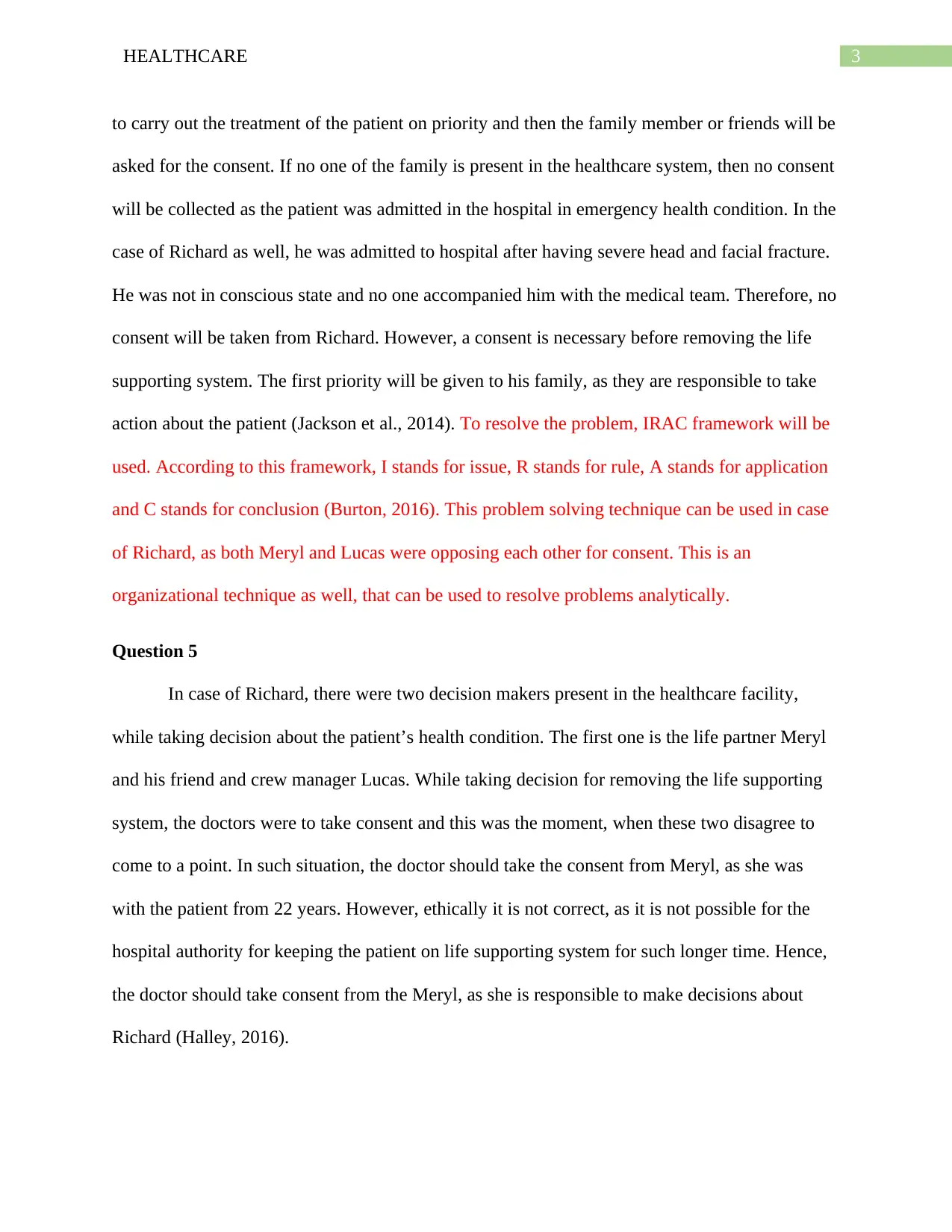
3HEALTHCARE
to carry out the treatment of the patient on priority and then the family member or friends will be
asked for the consent. If no one of the family is present in the healthcare system, then no consent
will be collected as the patient was admitted in the hospital in emergency health condition. In the
case of Richard as well, he was admitted to hospital after having severe head and facial fracture.
He was not in conscious state and no one accompanied him with the medical team. Therefore, no
consent will be taken from Richard. However, a consent is necessary before removing the life
supporting system. The first priority will be given to his family, as they are responsible to take
action about the patient (Jackson et al., 2014). To resolve the problem, IRAC framework will be
used. According to this framework, I stands for issue, R stands for rule, A stands for application
and C stands for conclusion (Burton, 2016). This problem solving technique can be used in case
of Richard, as both Meryl and Lucas were opposing each other for consent. This is an
organizational technique as well, that can be used to resolve problems analytically.
Question 5
In case of Richard, there were two decision makers present in the healthcare facility,
while taking decision about the patient’s health condition. The first one is the life partner Meryl
and his friend and crew manager Lucas. While taking decision for removing the life supporting
system, the doctors were to take consent and this was the moment, when these two disagree to
come to a point. In such situation, the doctor should take the consent from Meryl, as she was
with the patient from 22 years. However, ethically it is not correct, as it is not possible for the
hospital authority for keeping the patient on life supporting system for such longer time. Hence,
the doctor should take consent from the Meryl, as she is responsible to make decisions about
Richard (Halley, 2016).
to carry out the treatment of the patient on priority and then the family member or friends will be
asked for the consent. If no one of the family is present in the healthcare system, then no consent
will be collected as the patient was admitted in the hospital in emergency health condition. In the
case of Richard as well, he was admitted to hospital after having severe head and facial fracture.
He was not in conscious state and no one accompanied him with the medical team. Therefore, no
consent will be taken from Richard. However, a consent is necessary before removing the life
supporting system. The first priority will be given to his family, as they are responsible to take
action about the patient (Jackson et al., 2014). To resolve the problem, IRAC framework will be
used. According to this framework, I stands for issue, R stands for rule, A stands for application
and C stands for conclusion (Burton, 2016). This problem solving technique can be used in case
of Richard, as both Meryl and Lucas were opposing each other for consent. This is an
organizational technique as well, that can be used to resolve problems analytically.
Question 5
In case of Richard, there were two decision makers present in the healthcare facility,
while taking decision about the patient’s health condition. The first one is the life partner Meryl
and his friend and crew manager Lucas. While taking decision for removing the life supporting
system, the doctors were to take consent and this was the moment, when these two disagree to
come to a point. In such situation, the doctor should take the consent from Meryl, as she was
with the patient from 22 years. However, ethically it is not correct, as it is not possible for the
hospital authority for keeping the patient on life supporting system for such longer time. Hence,
the doctor should take consent from the Meryl, as she is responsible to make decisions about
Richard (Halley, 2016).
Paraphrase This Document
Need a fresh take? Get an instant paraphrase of this document with our AI Paraphraser
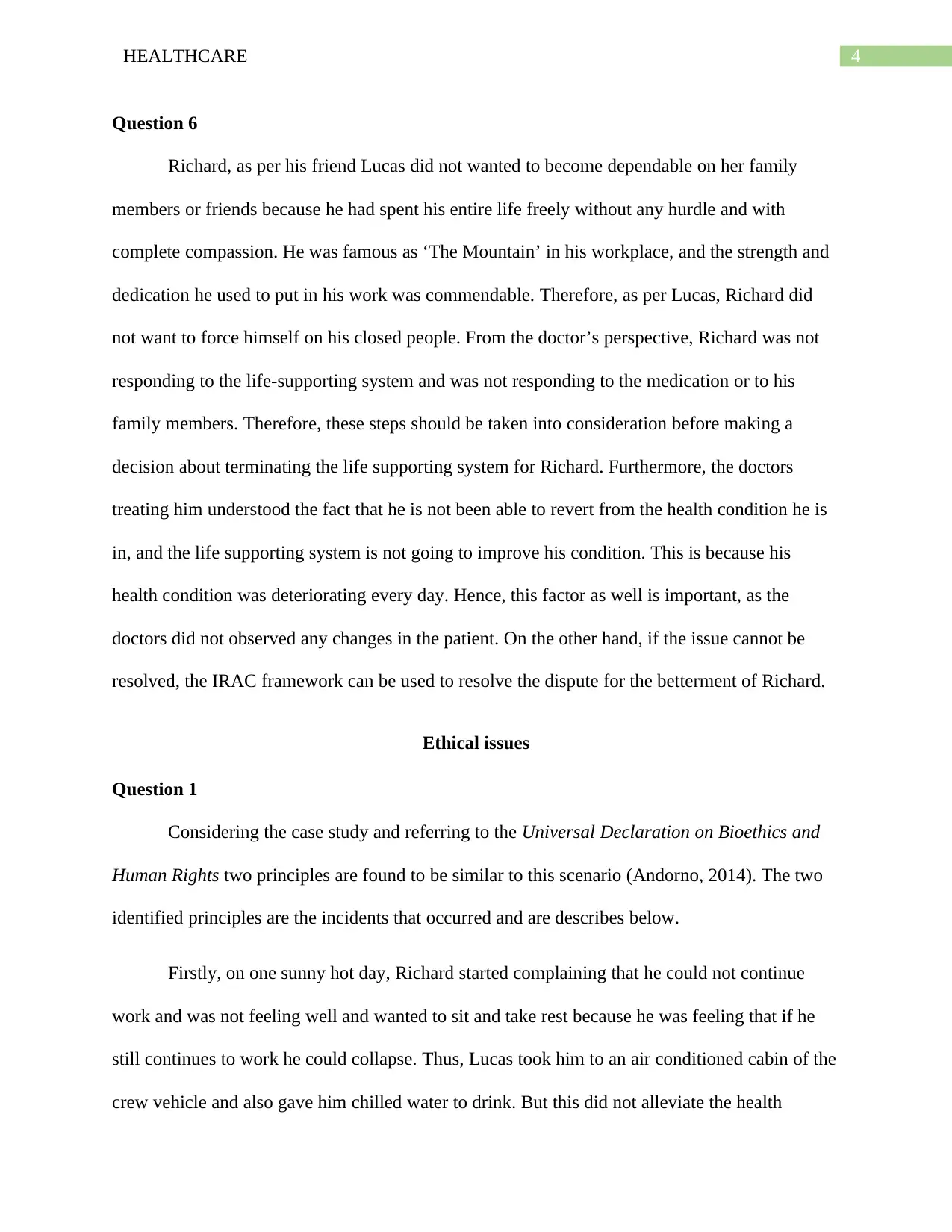
4HEALTHCARE
Question 6
Richard, as per his friend Lucas did not wanted to become dependable on her family
members or friends because he had spent his entire life freely without any hurdle and with
complete compassion. He was famous as ‘The Mountain’ in his workplace, and the strength and
dedication he used to put in his work was commendable. Therefore, as per Lucas, Richard did
not want to force himself on his closed people. From the doctor’s perspective, Richard was not
responding to the life-supporting system and was not responding to the medication or to his
family members. Therefore, these steps should be taken into consideration before making a
decision about terminating the life supporting system for Richard. Furthermore, the doctors
treating him understood the fact that he is not been able to revert from the health condition he is
in, and the life supporting system is not going to improve his condition. This is because his
health condition was deteriorating every day. Hence, this factor as well is important, as the
doctors did not observed any changes in the patient. On the other hand, if the issue cannot be
resolved, the IRAC framework can be used to resolve the dispute for the betterment of Richard.
Ethical issues
Question 1
Considering the case study and referring to the Universal Declaration on Bioethics and
Human Rights two principles are found to be similar to this scenario (Andorno, 2014). The two
identified principles are the incidents that occurred and are describes below.
Firstly, on one sunny hot day, Richard started complaining that he could not continue
work and was not feeling well and wanted to sit and take rest because he was feeling that if he
still continues to work he could collapse. Thus, Lucas took him to an air conditioned cabin of the
crew vehicle and also gave him chilled water to drink. But this did not alleviate the health
Question 6
Richard, as per his friend Lucas did not wanted to become dependable on her family
members or friends because he had spent his entire life freely without any hurdle and with
complete compassion. He was famous as ‘The Mountain’ in his workplace, and the strength and
dedication he used to put in his work was commendable. Therefore, as per Lucas, Richard did
not want to force himself on his closed people. From the doctor’s perspective, Richard was not
responding to the life-supporting system and was not responding to the medication or to his
family members. Therefore, these steps should be taken into consideration before making a
decision about terminating the life supporting system for Richard. Furthermore, the doctors
treating him understood the fact that he is not been able to revert from the health condition he is
in, and the life supporting system is not going to improve his condition. This is because his
health condition was deteriorating every day. Hence, this factor as well is important, as the
doctors did not observed any changes in the patient. On the other hand, if the issue cannot be
resolved, the IRAC framework can be used to resolve the dispute for the betterment of Richard.
Ethical issues
Question 1
Considering the case study and referring to the Universal Declaration on Bioethics and
Human Rights two principles are found to be similar to this scenario (Andorno, 2014). The two
identified principles are the incidents that occurred and are describes below.
Firstly, on one sunny hot day, Richard started complaining that he could not continue
work and was not feeling well and wanted to sit and take rest because he was feeling that if he
still continues to work he could collapse. Thus, Lucas took him to an air conditioned cabin of the
crew vehicle and also gave him chilled water to drink. But this did not alleviate the health
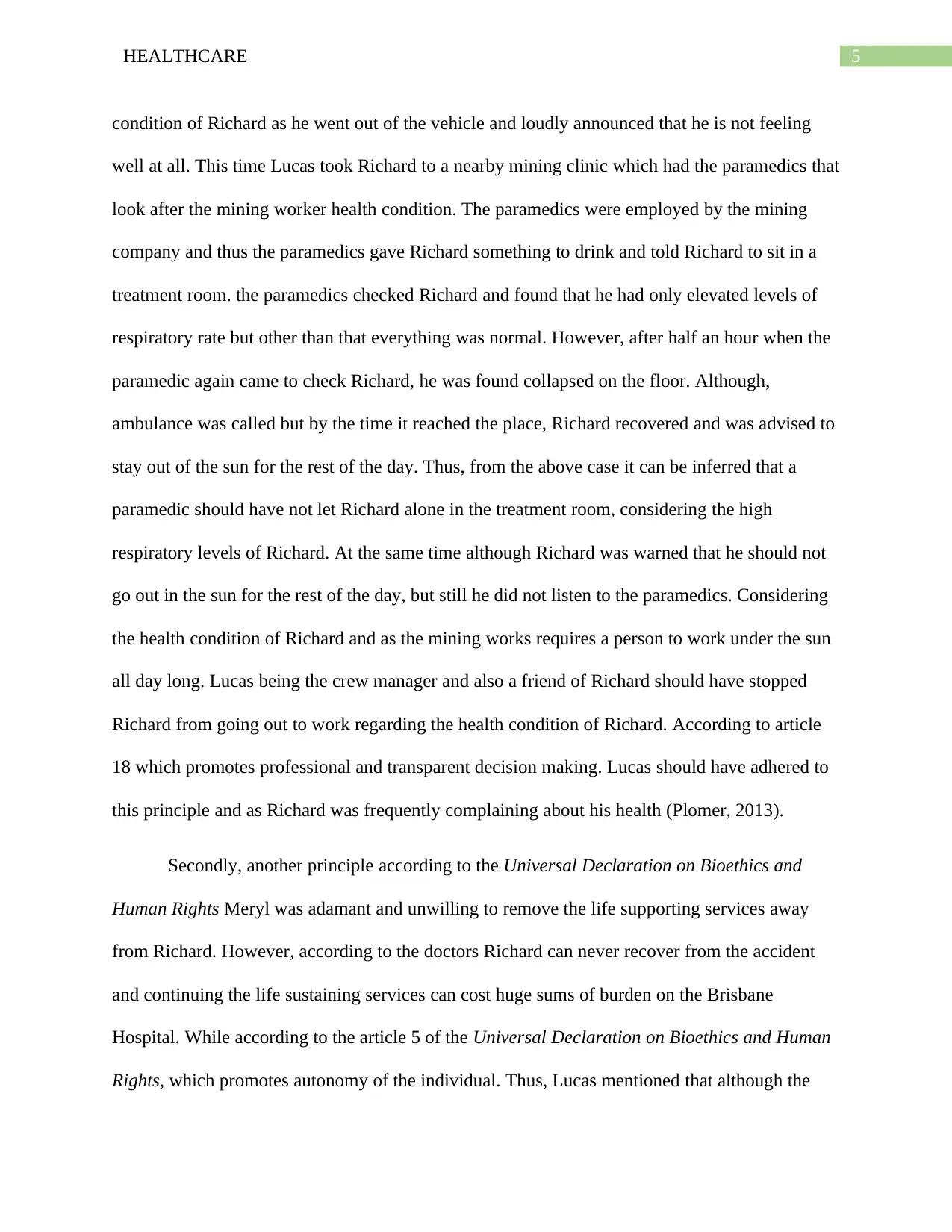
5HEALTHCARE
condition of Richard as he went out of the vehicle and loudly announced that he is not feeling
well at all. This time Lucas took Richard to a nearby mining clinic which had the paramedics that
look after the mining worker health condition. The paramedics were employed by the mining
company and thus the paramedics gave Richard something to drink and told Richard to sit in a
treatment room. the paramedics checked Richard and found that he had only elevated levels of
respiratory rate but other than that everything was normal. However, after half an hour when the
paramedic again came to check Richard, he was found collapsed on the floor. Although,
ambulance was called but by the time it reached the place, Richard recovered and was advised to
stay out of the sun for the rest of the day. Thus, from the above case it can be inferred that a
paramedic should have not let Richard alone in the treatment room, considering the high
respiratory levels of Richard. At the same time although Richard was warned that he should not
go out in the sun for the rest of the day, but still he did not listen to the paramedics. Considering
the health condition of Richard and as the mining works requires a person to work under the sun
all day long. Lucas being the crew manager and also a friend of Richard should have stopped
Richard from going out to work regarding the health condition of Richard. According to article
18 which promotes professional and transparent decision making. Lucas should have adhered to
this principle and as Richard was frequently complaining about his health (Plomer, 2013).
Secondly, another principle according to the Universal Declaration on Bioethics and
Human Rights Meryl was adamant and unwilling to remove the life supporting services away
from Richard. However, according to the doctors Richard can never recover from the accident
and continuing the life sustaining services can cost huge sums of burden on the Brisbane
Hospital. While according to the article 5 of the Universal Declaration on Bioethics and Human
Rights, which promotes autonomy of the individual. Thus, Lucas mentioned that although the
condition of Richard as he went out of the vehicle and loudly announced that he is not feeling
well at all. This time Lucas took Richard to a nearby mining clinic which had the paramedics that
look after the mining worker health condition. The paramedics were employed by the mining
company and thus the paramedics gave Richard something to drink and told Richard to sit in a
treatment room. the paramedics checked Richard and found that he had only elevated levels of
respiratory rate but other than that everything was normal. However, after half an hour when the
paramedic again came to check Richard, he was found collapsed on the floor. Although,
ambulance was called but by the time it reached the place, Richard recovered and was advised to
stay out of the sun for the rest of the day. Thus, from the above case it can be inferred that a
paramedic should have not let Richard alone in the treatment room, considering the high
respiratory levels of Richard. At the same time although Richard was warned that he should not
go out in the sun for the rest of the day, but still he did not listen to the paramedics. Considering
the health condition of Richard and as the mining works requires a person to work under the sun
all day long. Lucas being the crew manager and also a friend of Richard should have stopped
Richard from going out to work regarding the health condition of Richard. According to article
18 which promotes professional and transparent decision making. Lucas should have adhered to
this principle and as Richard was frequently complaining about his health (Plomer, 2013).
Secondly, another principle according to the Universal Declaration on Bioethics and
Human Rights Meryl was adamant and unwilling to remove the life supporting services away
from Richard. However, according to the doctors Richard can never recover from the accident
and continuing the life sustaining services can cost huge sums of burden on the Brisbane
Hospital. While according to the article 5 of the Universal Declaration on Bioethics and Human
Rights, which promotes autonomy of the individual. Thus, Lucas mentioned that although the
⊘ This is a preview!⊘
Do you want full access?
Subscribe today to unlock all pages.

Trusted by 1+ million students worldwide
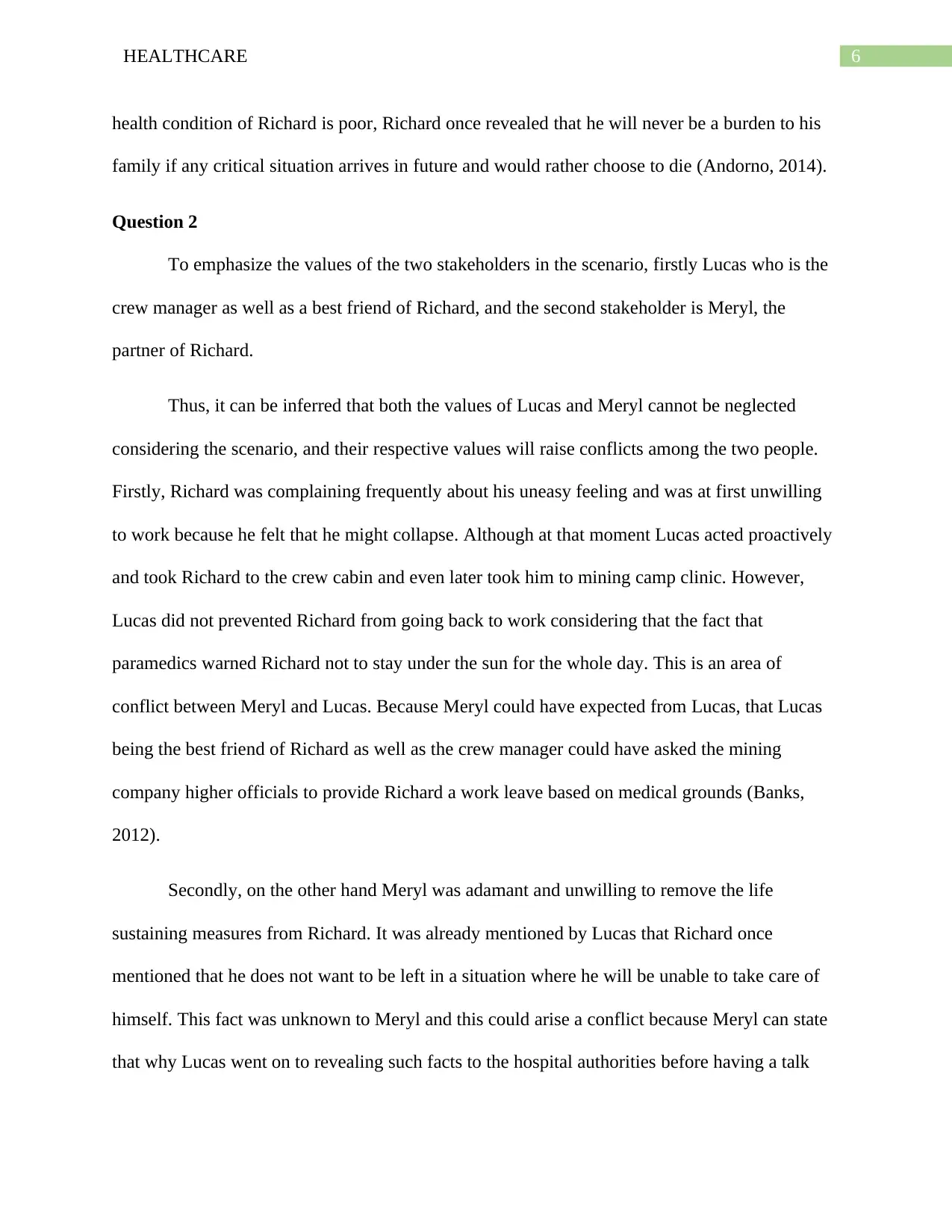
6HEALTHCARE
health condition of Richard is poor, Richard once revealed that he will never be a burden to his
family if any critical situation arrives in future and would rather choose to die (Andorno, 2014).
Question 2
To emphasize the values of the two stakeholders in the scenario, firstly Lucas who is the
crew manager as well as a best friend of Richard, and the second stakeholder is Meryl, the
partner of Richard.
Thus, it can be inferred that both the values of Lucas and Meryl cannot be neglected
considering the scenario, and their respective values will raise conflicts among the two people.
Firstly, Richard was complaining frequently about his uneasy feeling and was at first unwilling
to work because he felt that he might collapse. Although at that moment Lucas acted proactively
and took Richard to the crew cabin and even later took him to mining camp clinic. However,
Lucas did not prevented Richard from going back to work considering that the fact that
paramedics warned Richard not to stay under the sun for the whole day. This is an area of
conflict between Meryl and Lucas. Because Meryl could have expected from Lucas, that Lucas
being the best friend of Richard as well as the crew manager could have asked the mining
company higher officials to provide Richard a work leave based on medical grounds (Banks,
2012).
Secondly, on the other hand Meryl was adamant and unwilling to remove the life
sustaining measures from Richard. It was already mentioned by Lucas that Richard once
mentioned that he does not want to be left in a situation where he will be unable to take care of
himself. This fact was unknown to Meryl and this could arise a conflict because Meryl can state
that why Lucas went on to revealing such facts to the hospital authorities before having a talk
health condition of Richard is poor, Richard once revealed that he will never be a burden to his
family if any critical situation arrives in future and would rather choose to die (Andorno, 2014).
Question 2
To emphasize the values of the two stakeholders in the scenario, firstly Lucas who is the
crew manager as well as a best friend of Richard, and the second stakeholder is Meryl, the
partner of Richard.
Thus, it can be inferred that both the values of Lucas and Meryl cannot be neglected
considering the scenario, and their respective values will raise conflicts among the two people.
Firstly, Richard was complaining frequently about his uneasy feeling and was at first unwilling
to work because he felt that he might collapse. Although at that moment Lucas acted proactively
and took Richard to the crew cabin and even later took him to mining camp clinic. However,
Lucas did not prevented Richard from going back to work considering that the fact that
paramedics warned Richard not to stay under the sun for the whole day. This is an area of
conflict between Meryl and Lucas. Because Meryl could have expected from Lucas, that Lucas
being the best friend of Richard as well as the crew manager could have asked the mining
company higher officials to provide Richard a work leave based on medical grounds (Banks,
2012).
Secondly, on the other hand Meryl was adamant and unwilling to remove the life
sustaining measures from Richard. It was already mentioned by Lucas that Richard once
mentioned that he does not want to be left in a situation where he will be unable to take care of
himself. This fact was unknown to Meryl and this could arise a conflict because Meryl can state
that why Lucas went on to revealing such facts to the hospital authorities before having a talk
Paraphrase This Document
Need a fresh take? Get an instant paraphrase of this document with our AI Paraphraser
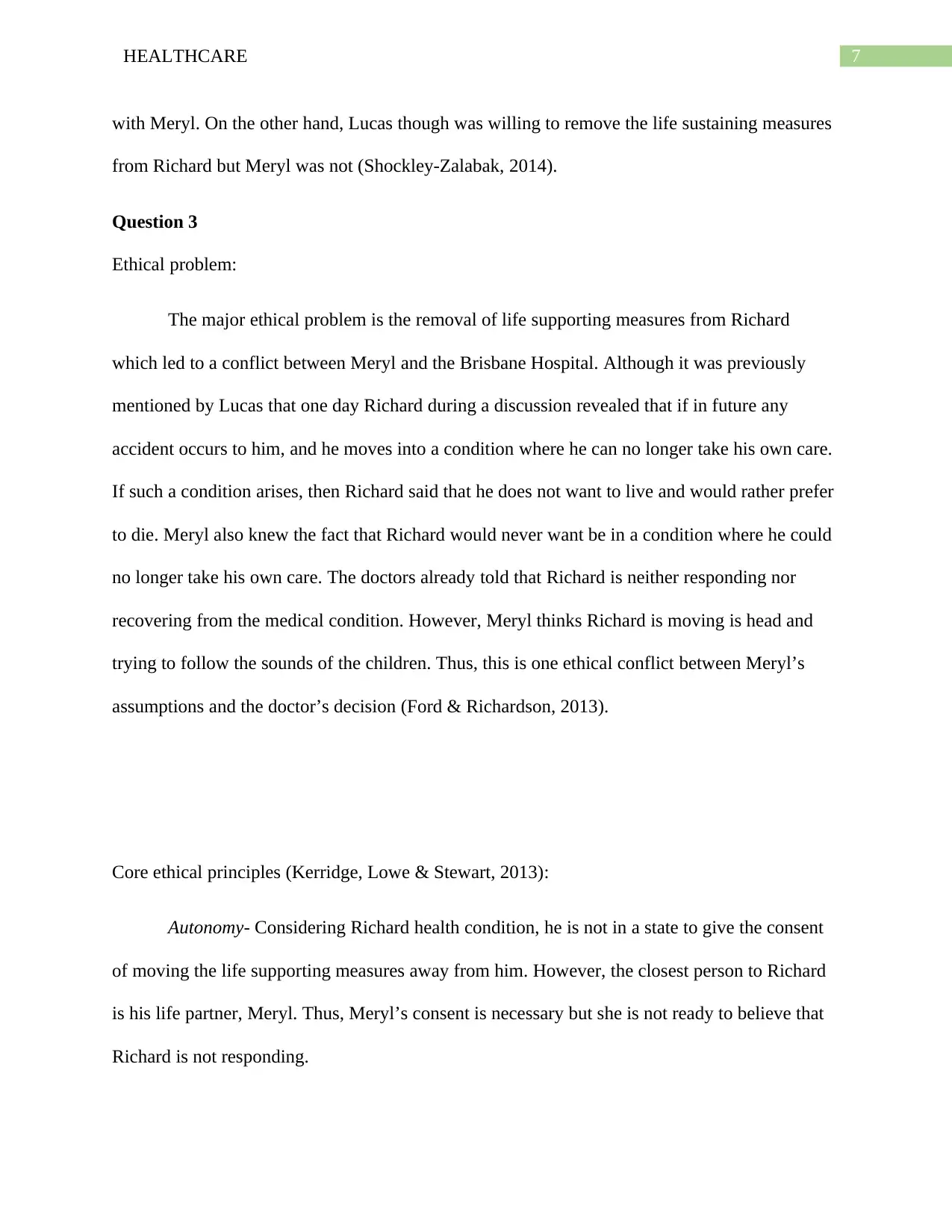
7HEALTHCARE
with Meryl. On the other hand, Lucas though was willing to remove the life sustaining measures
from Richard but Meryl was not (Shockley-Zalabak, 2014).
Question 3
Ethical problem:
The major ethical problem is the removal of life supporting measures from Richard
which led to a conflict between Meryl and the Brisbane Hospital. Although it was previously
mentioned by Lucas that one day Richard during a discussion revealed that if in future any
accident occurs to him, and he moves into a condition where he can no longer take his own care.
If such a condition arises, then Richard said that he does not want to live and would rather prefer
to die. Meryl also knew the fact that Richard would never want be in a condition where he could
no longer take his own care. The doctors already told that Richard is neither responding nor
recovering from the medical condition. However, Meryl thinks Richard is moving is head and
trying to follow the sounds of the children. Thus, this is one ethical conflict between Meryl’s
assumptions and the doctor’s decision (Ford & Richardson, 2013).
Core ethical principles (Kerridge, Lowe & Stewart, 2013):
Autonomy- Considering Richard health condition, he is not in a state to give the consent
of moving the life supporting measures away from him. However, the closest person to Richard
is his life partner, Meryl. Thus, Meryl’s consent is necessary but she is not ready to believe that
Richard is not responding.
with Meryl. On the other hand, Lucas though was willing to remove the life sustaining measures
from Richard but Meryl was not (Shockley-Zalabak, 2014).
Question 3
Ethical problem:
The major ethical problem is the removal of life supporting measures from Richard
which led to a conflict between Meryl and the Brisbane Hospital. Although it was previously
mentioned by Lucas that one day Richard during a discussion revealed that if in future any
accident occurs to him, and he moves into a condition where he can no longer take his own care.
If such a condition arises, then Richard said that he does not want to live and would rather prefer
to die. Meryl also knew the fact that Richard would never want be in a condition where he could
no longer take his own care. The doctors already told that Richard is neither responding nor
recovering from the medical condition. However, Meryl thinks Richard is moving is head and
trying to follow the sounds of the children. Thus, this is one ethical conflict between Meryl’s
assumptions and the doctor’s decision (Ford & Richardson, 2013).
Core ethical principles (Kerridge, Lowe & Stewart, 2013):
Autonomy- Considering Richard health condition, he is not in a state to give the consent
of moving the life supporting measures away from him. However, the closest person to Richard
is his life partner, Meryl. Thus, Meryl’s consent is necessary but she is not ready to believe that
Richard is not responding.
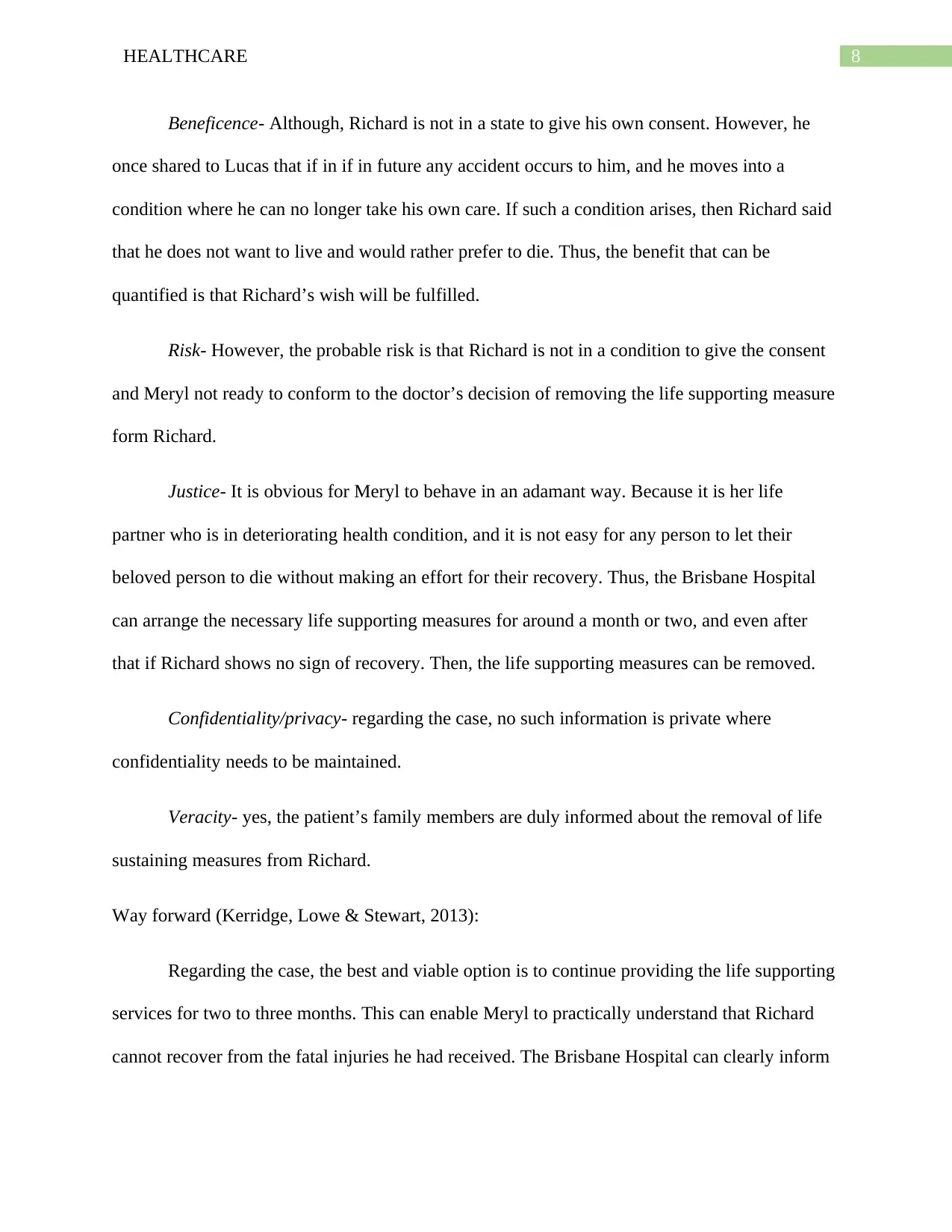
8HEALTHCARE
Beneficence- Although, Richard is not in a state to give his own consent. However, he
once shared to Lucas that if in if in future any accident occurs to him, and he moves into a
condition where he can no longer take his own care. If such a condition arises, then Richard said
that he does not want to live and would rather prefer to die. Thus, the benefit that can be
quantified is that Richard’s wish will be fulfilled.
Risk- However, the probable risk is that Richard is not in a condition to give the consent
and Meryl not ready to conform to the doctor’s decision of removing the life supporting measure
form Richard.
Justice- It is obvious for Meryl to behave in an adamant way. Because it is her life
partner who is in deteriorating health condition, and it is not easy for any person to let their
beloved person to die without making an effort for their recovery. Thus, the Brisbane Hospital
can arrange the necessary life supporting measures for around a month or two, and even after
that if Richard shows no sign of recovery. Then, the life supporting measures can be removed.
Confidentiality/privacy- regarding the case, no such information is private where
confidentiality needs to be maintained.
Veracity- yes, the patient’s family members are duly informed about the removal of life
sustaining measures from Richard.
Way forward (Kerridge, Lowe & Stewart, 2013):
Regarding the case, the best and viable option is to continue providing the life supporting
services for two to three months. This can enable Meryl to practically understand that Richard
cannot recover from the fatal injuries he had received. The Brisbane Hospital can clearly inform
Beneficence- Although, Richard is not in a state to give his own consent. However, he
once shared to Lucas that if in if in future any accident occurs to him, and he moves into a
condition where he can no longer take his own care. If such a condition arises, then Richard said
that he does not want to live and would rather prefer to die. Thus, the benefit that can be
quantified is that Richard’s wish will be fulfilled.
Risk- However, the probable risk is that Richard is not in a condition to give the consent
and Meryl not ready to conform to the doctor’s decision of removing the life supporting measure
form Richard.
Justice- It is obvious for Meryl to behave in an adamant way. Because it is her life
partner who is in deteriorating health condition, and it is not easy for any person to let their
beloved person to die without making an effort for their recovery. Thus, the Brisbane Hospital
can arrange the necessary life supporting measures for around a month or two, and even after
that if Richard shows no sign of recovery. Then, the life supporting measures can be removed.
Confidentiality/privacy- regarding the case, no such information is private where
confidentiality needs to be maintained.
Veracity- yes, the patient’s family members are duly informed about the removal of life
sustaining measures from Richard.
Way forward (Kerridge, Lowe & Stewart, 2013):
Regarding the case, the best and viable option is to continue providing the life supporting
services for two to three months. This can enable Meryl to practically understand that Richard
cannot recover from the fatal injuries he had received. The Brisbane Hospital can clearly inform
⊘ This is a preview!⊘
Do you want full access?
Subscribe today to unlock all pages.

Trusted by 1+ million students worldwide
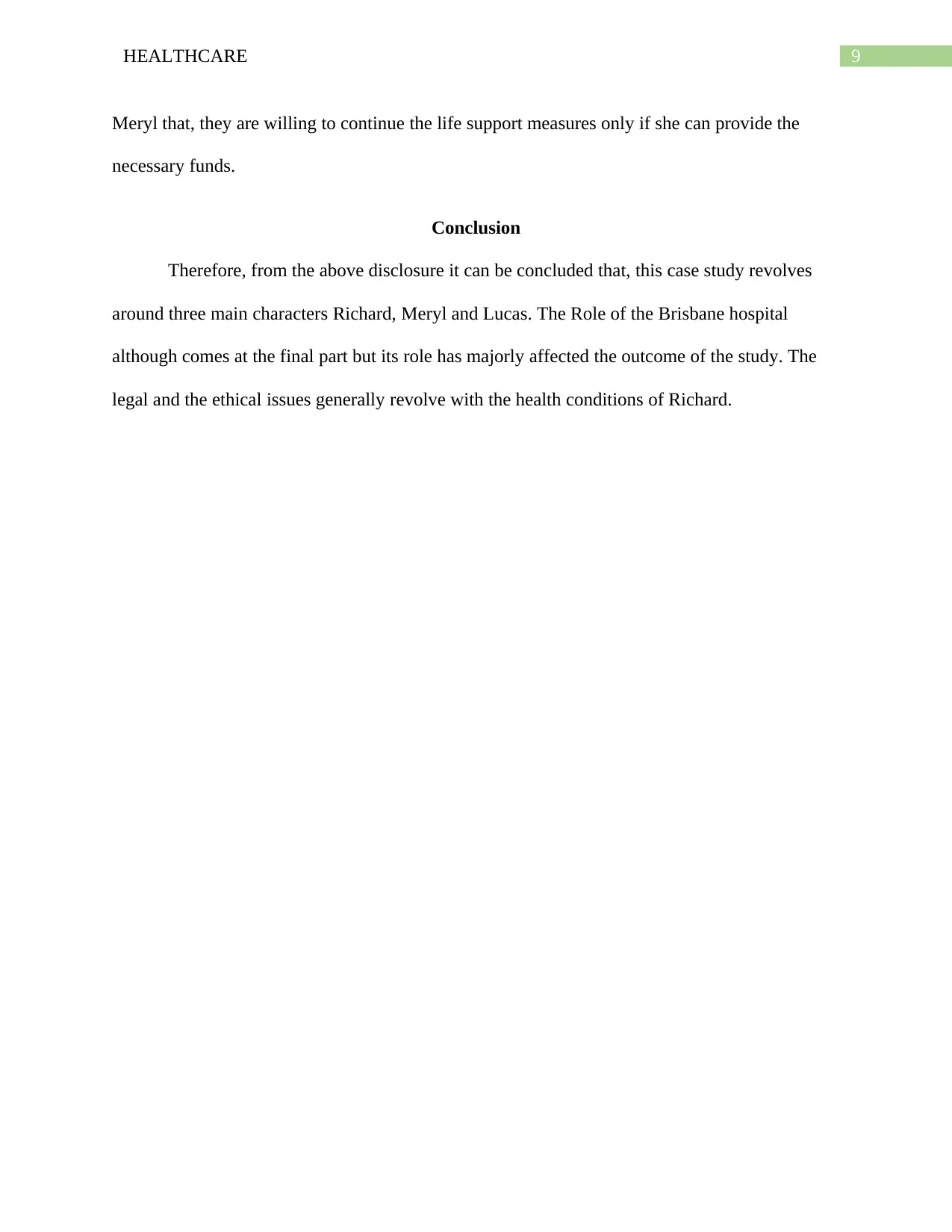
9HEALTHCARE
Meryl that, they are willing to continue the life support measures only if she can provide the
necessary funds.
Conclusion
Therefore, from the above disclosure it can be concluded that, this case study revolves
around three main characters Richard, Meryl and Lucas. The Role of the Brisbane hospital
although comes at the final part but its role has majorly affected the outcome of the study. The
legal and the ethical issues generally revolve with the health conditions of Richard.
Meryl that, they are willing to continue the life support measures only if she can provide the
necessary funds.
Conclusion
Therefore, from the above disclosure it can be concluded that, this case study revolves
around three main characters Richard, Meryl and Lucas. The Role of the Brisbane hospital
although comes at the final part but its role has majorly affected the outcome of the study. The
legal and the ethical issues generally revolve with the health conditions of Richard.
Paraphrase This Document
Need a fresh take? Get an instant paraphrase of this document with our AI Paraphraser
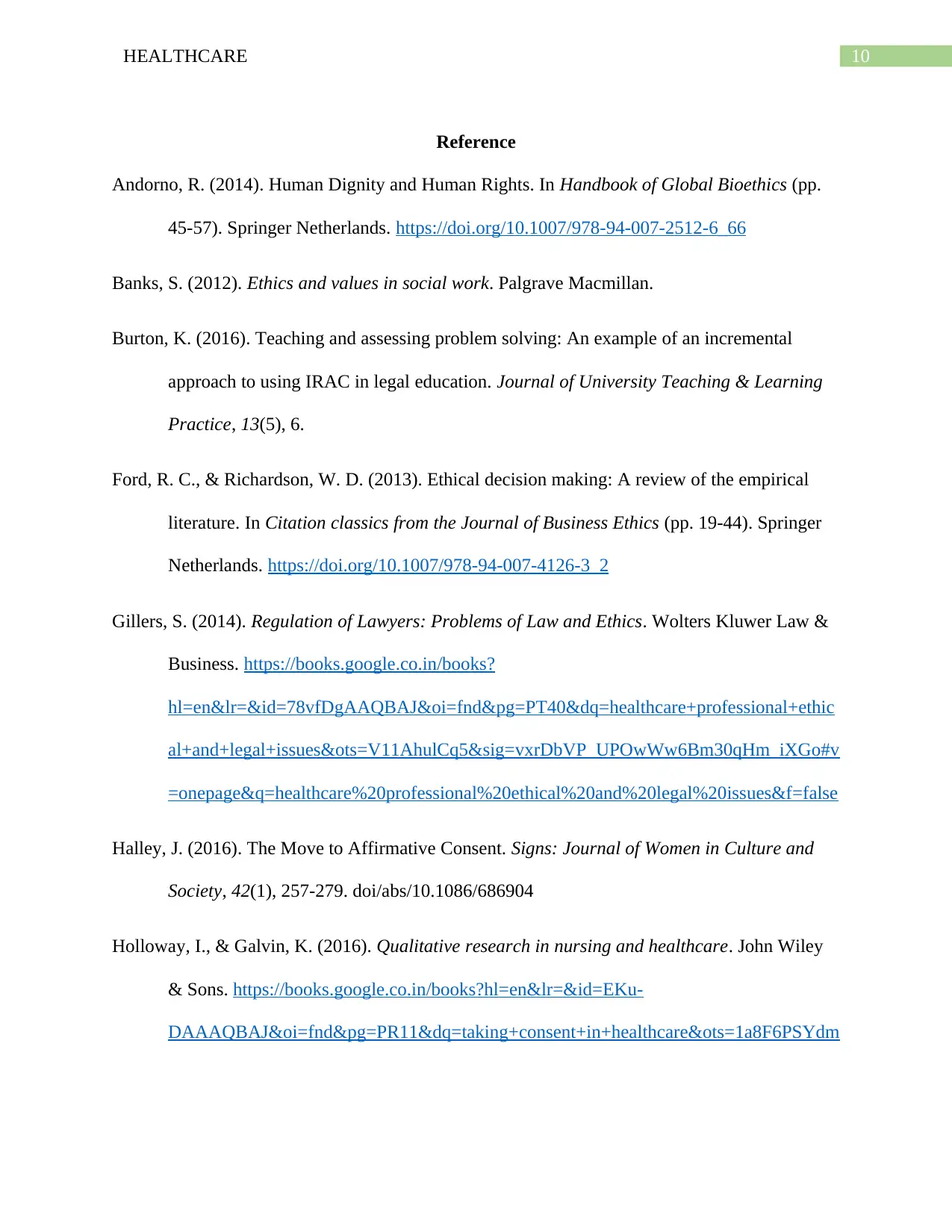
10HEALTHCARE
Reference
Andorno, R. (2014). Human Dignity and Human Rights. In Handbook of Global Bioethics (pp.
45-57). Springer Netherlands. https://doi.org/10.1007/978-94-007-2512-6_66
Banks, S. (2012). Ethics and values in social work. Palgrave Macmillan.
Burton, K. (2016). Teaching and assessing problem solving: An example of an incremental
approach to using IRAC in legal education. Journal of University Teaching & Learning
Practice, 13(5), 6.
Ford, R. C., & Richardson, W. D. (2013). Ethical decision making: A review of the empirical
literature. In Citation classics from the Journal of Business Ethics (pp. 19-44). Springer
Netherlands. https://doi.org/10.1007/978-94-007-4126-3_2
Gillers, S. (2014). Regulation of Lawyers: Problems of Law and Ethics. Wolters Kluwer Law &
Business. https://books.google.co.in/books?
hl=en&lr=&id=78vfDgAAQBAJ&oi=fnd&pg=PT40&dq=healthcare+professional+ethic
al+and+legal+issues&ots=V11AhulCq5&sig=vxrDbVP_UPOwWw6Bm30qHm_iXGo#v
=onepage&q=healthcare%20professional%20ethical%20and%20legal%20issues&f=false
Halley, J. (2016). The Move to Affirmative Consent. Signs: Journal of Women in Culture and
Society, 42(1), 257-279. doi/abs/10.1086/686904
Holloway, I., & Galvin, K. (2016). Qualitative research in nursing and healthcare. John Wiley
& Sons. https://books.google.co.in/books?hl=en&lr=&id=EKu-
DAAAQBAJ&oi=fnd&pg=PR11&dq=taking+consent+in+healthcare&ots=1a8F6PSYdm
Reference
Andorno, R. (2014). Human Dignity and Human Rights. In Handbook of Global Bioethics (pp.
45-57). Springer Netherlands. https://doi.org/10.1007/978-94-007-2512-6_66
Banks, S. (2012). Ethics and values in social work. Palgrave Macmillan.
Burton, K. (2016). Teaching and assessing problem solving: An example of an incremental
approach to using IRAC in legal education. Journal of University Teaching & Learning
Practice, 13(5), 6.
Ford, R. C., & Richardson, W. D. (2013). Ethical decision making: A review of the empirical
literature. In Citation classics from the Journal of Business Ethics (pp. 19-44). Springer
Netherlands. https://doi.org/10.1007/978-94-007-4126-3_2
Gillers, S. (2014). Regulation of Lawyers: Problems of Law and Ethics. Wolters Kluwer Law &
Business. https://books.google.co.in/books?
hl=en&lr=&id=78vfDgAAQBAJ&oi=fnd&pg=PT40&dq=healthcare+professional+ethic
al+and+legal+issues&ots=V11AhulCq5&sig=vxrDbVP_UPOwWw6Bm30qHm_iXGo#v
=onepage&q=healthcare%20professional%20ethical%20and%20legal%20issues&f=false
Halley, J. (2016). The Move to Affirmative Consent. Signs: Journal of Women in Culture and
Society, 42(1), 257-279. doi/abs/10.1086/686904
Holloway, I., & Galvin, K. (2016). Qualitative research in nursing and healthcare. John Wiley
& Sons. https://books.google.co.in/books?hl=en&lr=&id=EKu-
DAAAQBAJ&oi=fnd&pg=PR11&dq=taking+consent+in+healthcare&ots=1a8F6PSYdm
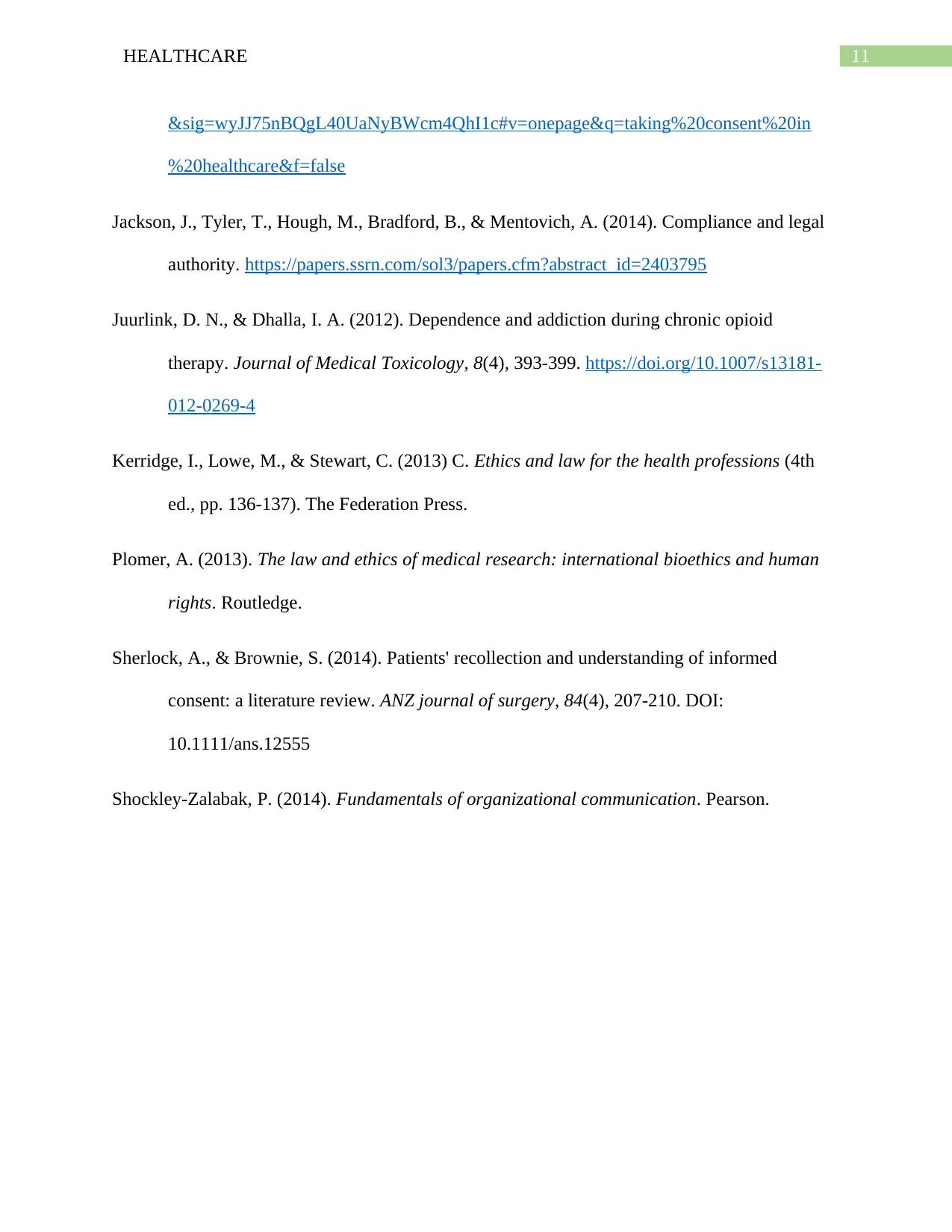
11HEALTHCARE
&sig=wyJJ75nBQgL40UaNyBWcm4QhI1c#v=onepage&q=taking%20consent%20in
%20healthcare&f=false
Jackson, J., Tyler, T., Hough, M., Bradford, B., & Mentovich, A. (2014). Compliance and legal
authority. https://papers.ssrn.com/sol3/papers.cfm?abstract_id=2403795
Juurlink, D. N., & Dhalla, I. A. (2012). Dependence and addiction during chronic opioid
therapy. Journal of Medical Toxicology, 8(4), 393-399. https://doi.org/10.1007/s13181-
012-0269-4
Kerridge, I., Lowe, M., & Stewart, C. (2013) C. Ethics and law for the health professions (4th
ed., pp. 136-137). The Federation Press.
Plomer, A. (2013). The law and ethics of medical research: international bioethics and human
rights. Routledge.
Sherlock, A., & Brownie, S. (2014). Patients' recollection and understanding of informed
consent: a literature review. ANZ journal of surgery, 84(4), 207-210. DOI:
10.1111/ans.12555
Shockley-Zalabak, P. (2014). Fundamentals of organizational communication. Pearson.
&sig=wyJJ75nBQgL40UaNyBWcm4QhI1c#v=onepage&q=taking%20consent%20in
%20healthcare&f=false
Jackson, J., Tyler, T., Hough, M., Bradford, B., & Mentovich, A. (2014). Compliance and legal
authority. https://papers.ssrn.com/sol3/papers.cfm?abstract_id=2403795
Juurlink, D. N., & Dhalla, I. A. (2012). Dependence and addiction during chronic opioid
therapy. Journal of Medical Toxicology, 8(4), 393-399. https://doi.org/10.1007/s13181-
012-0269-4
Kerridge, I., Lowe, M., & Stewart, C. (2013) C. Ethics and law for the health professions (4th
ed., pp. 136-137). The Federation Press.
Plomer, A. (2013). The law and ethics of medical research: international bioethics and human
rights. Routledge.
Sherlock, A., & Brownie, S. (2014). Patients' recollection and understanding of informed
consent: a literature review. ANZ journal of surgery, 84(4), 207-210. DOI:
10.1111/ans.12555
Shockley-Zalabak, P. (2014). Fundamentals of organizational communication. Pearson.
⊘ This is a preview!⊘
Do you want full access?
Subscribe today to unlock all pages.

Trusted by 1+ million students worldwide
1 out of 12
Related Documents
Your All-in-One AI-Powered Toolkit for Academic Success.
+13062052269
info@desklib.com
Available 24*7 on WhatsApp / Email
![[object Object]](/_next/static/media/star-bottom.7253800d.svg)
Unlock your academic potential
Copyright © 2020–2026 A2Z Services. All Rights Reserved. Developed and managed by ZUCOL.




